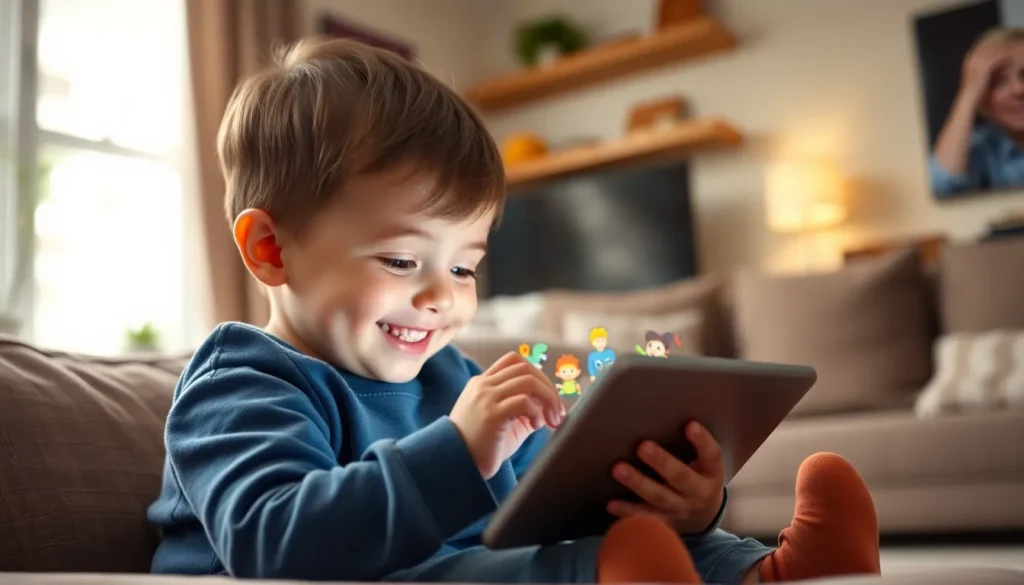In a world where toddlers can swipe before they can walk, educational apps for 2-year-olds have become the modern-day magic wands of early learning. These digital gems not only keep little ones entertained but also sneak in valuable lessons while they giggle and tap away. Who knew learning could be this fun?
Table of Contents
ToggleBenefits Of Educational Apps For 2 Year Olds
Educational apps greatly enhance the learning experience for 2-year-olds. These tools effectively combine fun and education, providing numerous developmental benefits.
Cognitive Development
Cognitive development occurs through interactive activities that stimulate problem-solving skills. Engaging puzzles or memory games encourage critical thinking in toddlers. Children experience immediate feedback, which reinforces their learning and understanding. These applications often incorporate colorful graphics, capturing attention and enhancing focus. Learning through play promotes essential skills such as reasoning and decision-making.
Language Skills Enhancement
Language skills improvement starts with apps that feature storytelling and vocabulary-building exercises. Many apps utilize songs and rhymes, making language acquisition enjoyable for toddlers. Engaging prompts encourage children to repeat words, improving pronunciation and vocabulary retention. Regular use supports the development of listening skills, as children must follow directions and engage with content. Interactive elements, like voice recognition, provide opportunities for verbal expression and interaction.
Top Educational Apps For 2 Year Olds

Educational apps for 2-year-olds offer engaging ways to support early learning. The following apps stand out for their unique features and benefits.
App 1: Overview And Features
Zoombinis provides a delightful introduction to logic and problem-solving. This app encourages toddlers to complete challenges by guiding colorful characters through puzzles. It uses vibrant visuals to capture attention while promoting analytical thinking. By engaging with age-appropriate tasks, kids develop cognitive skills and build foundational knowledge. Fun interactions support learning moments, making it a favorite among parents and educators.
App 2: Overview And Features
Endless Alphabet captivates toddlers with its animated characters and interactive vocabulary lessons. This app introduces new words in a playful manner, integrating definitions with delightful visual aids. Kids drag and drop letters to form words, enhancing motor skills simultaneously. Engaging illustrations reinforce understanding, making learning feel enjoyable. Parents appreciate how this app fosters early literacy in an entertaining format.
App 3: Overview And Features
ABCmouse stands out with its comprehensive curriculum tailored for young learners. This app features a wide variety of games, activities, and songs that cover subjects like math, reading, and art. Engaging lessons adapt to each child’s learning pace, ensuring individualized progress. The use of colorful graphics adds to the fun, keeping toddlers interested. Many parents laud ABCmouse for its effectiveness in preparing children for preschool and beyond.
Tips For Using Educational Apps Effectively
Using educational apps for 2-year-olds can enhance their learning experience when approached correctly. Following specific tips helps maximize their effectiveness.
Screen Time Guidelines
Experts recommend limiting screen time for toddlers. Aim for no more than one hour per day of high-quality programming. This recommendation ensures children engage in a balanced mix of activities. Schedule app usage around daily routines, so it doesn’t interfere with physical play or face-to-face interactions. Encourage breaks during app usage to prevent overstimulation and promote healthy habits. Children should alternate between screen time and other activities to maintain a well-rounded learning experience.
Engaging With Your Child During Use
Engagement is crucial when using educational apps. Parents can enhance learning by participating alongside their child during app activities. Asking questions about the content encourages critical thinking and verbal expression. Celebrate achievements and progress within the app to boost motivation. Conversations about what the child learns stimulate cognitive development and reinforce concepts. Avoid passive observation; instead, interact with the child, fostering a collaborative learning environment. Prioritizing participation leads to a richer and more fulfilling educational experience.
Safety And Privacy Considerations
Safety and privacy considerations are vital when selecting educational apps for 2-year-olds. Parents must ensure that their child engages with secure and suitable content.
Choosing Age-Appropriate Content
Selecting age-appropriate content is essential for toddlers’ learning and development. Educational apps should align with the developmental milestones typical for 2-year-olds. Look for apps that feature simple navigation, colorful visuals, and interactive elements. Moreover, apps that focus on foundational skills, such as basic vocabulary and number recognition, support early learning. Parents can read reviews and check app ratings to assess whether an app is suitable. Engaging with content designed for their age ensures that toddlers remain interested while fostering cognitive growth.
Protecting Your Child’s Privacy
Protecting a child’s privacy is critical when using educational apps. Many apps require personal information, including names or email addresses, which should be shared cautiously. Always review privacy settings within the app to minimize data collection. Opt for apps that adhere to relevant privacy regulations, such as COPPA. It limits data collection from children under 13 years. Additionally, using secure devices and monitoring app usage helps in safeguarding personal information. Staying informed about an app’s privacy policy ensures that children can enjoy learning without compromising their safety.
Educational apps for 2-year-olds offer a unique blend of fun and learning that can significantly benefit early development. By engaging toddlers with interactive content these apps foster cognitive and language skills in an enjoyable way.
Parents play a crucial role in maximizing the advantages of these tools through active participation and mindful usage. Monitoring screen time and ensuring age-appropriate content can create a safe and enriching learning environment.
As technology continues to evolve these educational apps will likely become even more integral to early childhood education. Embracing these resources can pave the way for a brighter educational journey for young learners.




